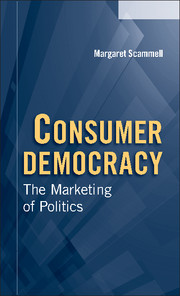Book contents
- Frontmatter
- Dedication
- Contents
- List of Tables, Figures, and Images
- Acknowledgments
- Preface: The U.S. Presidential Election of 2012
- Introduction
- 1 Political Marketing
- 2 Political Marketers
- 3 Political Brands
- 4 George W. Bush
- 5 Campaigning Effects
- 6 Citizen Consumers, Political Marketing, and Democracy
- Conclusion
- References
- Index
3 - Political Brands
The Latest Stage of Political Marketing and the Case of Tony Blair
Published online by Cambridge University Press: 05 June 2014
- Frontmatter
- Dedication
- Contents
- List of Tables, Figures, and Images
- Acknowledgments
- Preface: The U.S. Presidential Election of 2012
- Introduction
- 1 Political Marketing
- 2 Political Marketers
- 3 Political Brands
- 4 George W. Bush
- 5 Campaigning Effects
- 6 Citizen Consumers, Political Marketing, and Democracy
- Conclusion
- References
- Index
Summary
By the summer of 2007 the presidential race in the United States was already moving into high gear and the commercial brand consultancy Chernoff Newman seized the opportunity to showcase its talents (Image 3.1). Picture Hillary Clinton as a car and she would be a Volvo, according to the agency’s market research: “solid, reliable and there to get the job done, not make you fall in love.” Barack Obama was a “BMW Z4 convertible, sporty, flashy and fun”; Rudy Giuliani, a Toyota crossover vehicle; John McCain was the all-American Ford pickup, and Mitt Romney “a Dodge Viper – it looks like it’s built for speed, but is too unfamiliar to the average driver to know for sure.” It is entertaining stuff, and it is an intriguing new way for agencies to advertise their work.
These brand analogies are not real, in the sense that they were neither commissioned by the campaigns nor designed to help candidate strategy. However, they are real in that they are drawn from market research and promoted to lend credibility and an aura of importance to an agency’s broader brand-building approaches. Their political interest is less that they tell us anything particularly new about public opinion, but the way they do it; in condensed and striking fashion with the implication that voters are entirely comfortable with and possibly more honest in their assessments, when asked to compare would-be world leaders with product brands. These cartoons are more or less amusing, but they do not seem absurdly inappropriate. We are now so accustomed to the use of marketing language in political campaigns that these images do not shock us. On the contrary, they are illustrative of the kind of work that actually happens in campaigns; candidates and parties are imagined, researched, and developed as competing brands. They reflect in part the way that professional campaigners increasingly perceive voters, as comfortable consumers whose political choices are infused with brand values.
- Type
- Chapter
- Information
- Consumer DemocracyThe Marketing of Politics, pp. 66 - 87Publisher: Cambridge University PressPrint publication year: 2014



